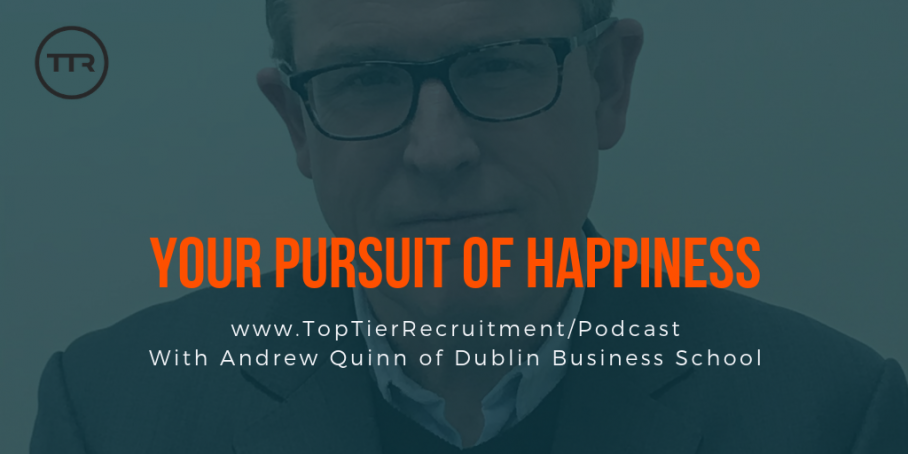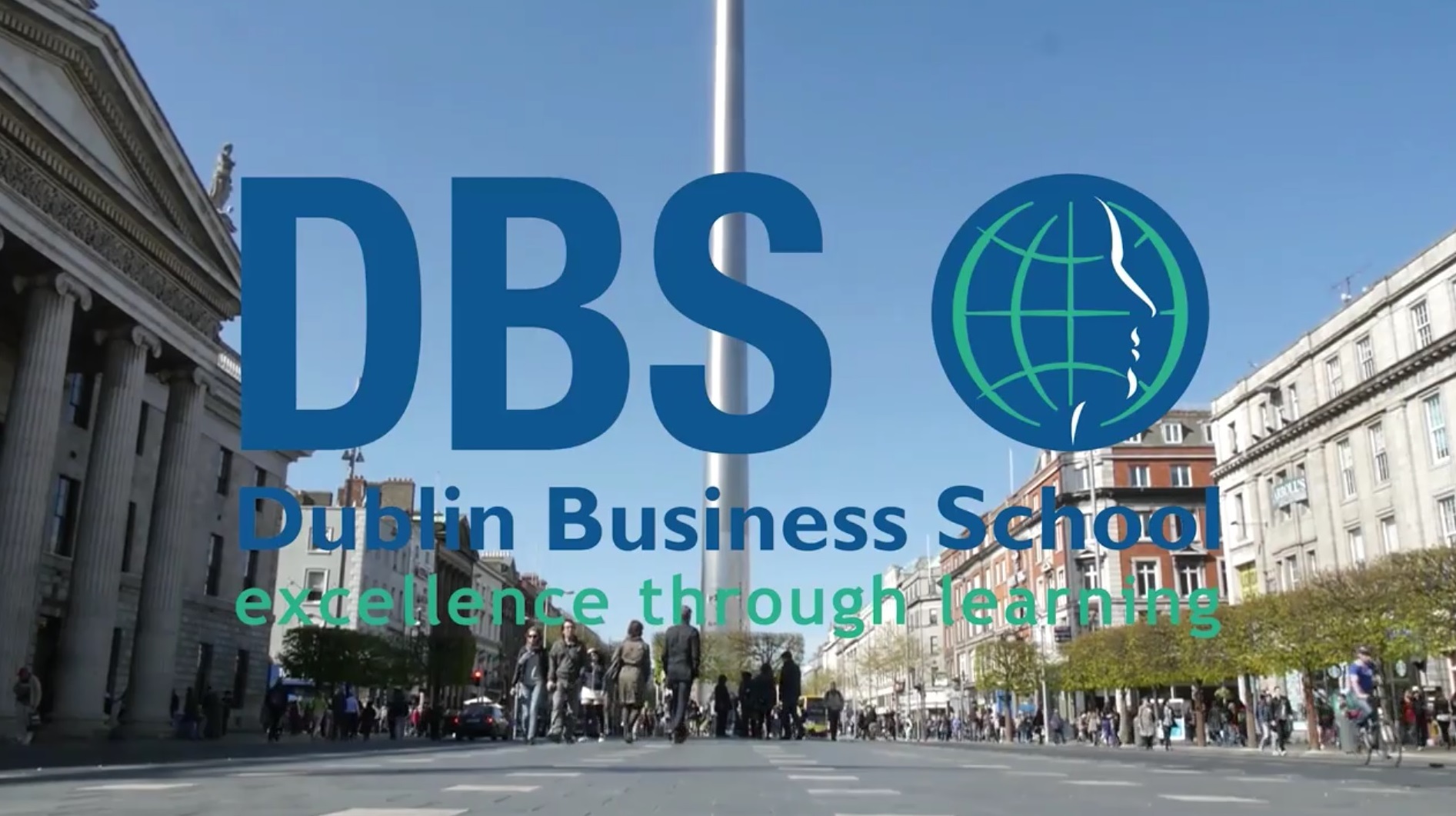Talking Fintech With Andrew Quinn of Dublin Business School

We were very pleased to be joined on the Your Pursuit of Happiness podcast by Andrew Quinn, Course Director for Accountancy, Finance, Financial Technology & Business Analytics Programs at Dublin Business School.
Andrew's Background
Laura Smyth: Andrew, thank you very much for joining us today.
Andrew Quinn: Oh, my pleasure.
Laura Smyth: Excellent. Do you mind if we kick it off, if you'd just talk us through your background?
Andrew Quinn: Yeah. First of all, the accent, which always kind of throws people off. I'm from Waterford, the long way around. My father's from Waterford, my mother's from Kildare. They met and married in Birmingham, England, and I was born in Birmingham. I was about 15 when we came back to Waterford, so I'd never quite lost that. It was interesting going from Birmingham to Waterford, pretty formative experience.
Andrew Quinn: I went to college in Waterford after school, obviously. I did a business degree. I was always, for some reason, maybe my father was a big influence, interested in news, the world, politics, history. I was always really interested. That kind of led me into being kind of interested in financial markets, I suppose, because I saw them as a bit of a kind of prism through a lot of these sort of themes get played out, macro economic, geopolitical.
Andrew Quinn: So I went to London, and my first proper job was at Lehman Brothers, but that's got nothing to do with me, what happened subsequently. I was a long time gone, by the time things unraveled. That led me into a world of hedge funds and I ended up being a trader, basically. I worked in The Bahamas for a number of years as a trader for a hedge fund. So my background is really, I suppose, very much ... and I've thought about this recently ... it's very much, I suppose, centered around markets and finance, and capital markets in particular.
Andrew Quinn: That kind of obviously led me into being very interested in the way financial services are delivered, and about 10 years ago, I got interested in this new thing called FinTech, which now has become something of a cliche. But 10 years ago, it was a relatively kind of new concept. But the thing really is, it's not a new concept. You know, financial services are, in my opinion, essentially what they are. They've essentially been pretty similar to what they were in the Greeks and the Romans and stuff like that.
Andrew Quinn: I think what's changed, though, clearly over time, we've had periods of real innovation and change, driven by technology, and I just think in the last five, 10 years, we're obviously in one of those periods. I accidentally ended up lecturing. Really did, accidentally. Friend of mine, basically, about seven, eight years ago, said to me, "DBS are looking for finance lecturers. You never shut up, so maybe this is something for you." So I fell into lecturing.

Andrew Quinn: For me, it was one of the best things that ever happened to me in my life, because after a fairly short period of time, I just honestly found it vocational. I use that word very carefully, because I know it has a certain schmaltzy value and people say these things. But for me, it truly was. And it's led on to where I am now. I develop the programs here, and I now sort of run the programs in finance, accountancy kind of area. Yeah, the job is big, but I love it.
Laura Smyth: We can certainly hear your passion for it.
Andrew Quinn: Oh, thank you.
Laura Smyth: You never thought, with that accent, to audition for a part on Peaky Blinders?
Andrew Quinn: Oh, honestly, I clearly love Peakies, and really, Peakies put Birmingham on the map a little bit, to some degree. One of my favorite stories of recent years is, I genuinely saw Cillian Murphy in the street one day. I always think that people like Cillian, or people who are famous or visible, they must hate it when everybody's running up to them saying hello or whatever they are, and I therefore would never do that. But I was so tempted to give Cillian my best John Boy. You know, "How are you doing, John Boy?" I was so tempted to do it. I didn't do it, but I kind of wish I had.

Laura Smyth: You never know. This could reach Cillian Murphy.
Andrew Quinn: Yeah, you never know. Cillian, I'm always up for a bit part in Peakies. I'd do it fine.
Paul Smyth: What kind of trading were you're doing, Andrew, just out of interest?
Andrew Quinn: The hedge fund I essentially ended up working for was what you might call a macro hedge fund. So it was very thematic. It was very much like, you know, "We think the dollar's going to appreciate. We think interest rates are going up or down. We think technology stocks are overvalued versus, say, industrials." So it was very big macro plays, very thematic. We used, actually, a lot of derivatives. I had a fairly strong grounding in options. We used a lot of options to kind of express our views. Mainly buying options to express a view on a direction, but we also got involved in different strategies and messed around with some exotics and stuff like that. So very thematic and very kind of derivative, particularly option driven.
Paul Smyth: Good stuff. Obviously, the three of us know each other from the tech side of what you do with DBS. What do you guys do, and where do you see yourselves fitting into that wider FinTech ecosystem?
Andrew Quinn: Look, first of all, I have to honestly express my gratitude. The two of you, like many other people, actually, have been very generous in their support. When I sort of started this, I suppose about three years ago, when I literally, it was a blank sheet of paper, "Here, go and write a FinTech program." We have a Higher Diploma and we have a Master's program which are now running, which I'm very proud of. But we're in the early days of this, and there's still a lot of iterations that we need to make as we learn more about delivering the program in the classroom. But for me, honestly, it's evolved. I think it was very well-captured in the recent government strategy, IFS 2025. That talks about the pillars that we need to build and maintain to support the Irish financial services industry, and one of the pillars is the talent pillar.
Andrew Quinn: So I clearly hope that DBS can be a strong part of this talent pillar that supports the overall evolution and innovation in the financial services industry in Ireland, and Europe, and globally, for that matter. Look, for me, it's clearly about producing graduates that have the skills and the attributes that industry is looking for. So I spend a lot of time, as I think you know, Paul ... and again, I appreciate your support in this ... I spend a lot of time trying to meet, talk, have industry events, and I spent a lot of time trying to filter that back into what we're doing and what we're trying to achieve.
Laura Smyth: Aside from fund grads, who do you see taking up the courses in the area? Do you see any career switchers or-
Andrew Quinn: Yeah. That's also again something ... Again, I take a lot of pride in trying to make this work for people. For example, even this week, we had a so-called open evening, where basically, lecturers and other people will be available if people want to come in and talk about their thinking of doing a particular course. I've always done that, and I suppose it's informed me, but in particular we have a Higher Diploma, which is literally meant to be a conversion course. It's literally designed and it's funded by the government through the Springboard program, so 90% of the funding is there for anybody who mainly has a graduate degree already, although sometimes work experience can also be make you eligible for this.
Andrew Quinn: It's designed for people who are perhaps ... For example, the other night I met a guy who's in the hospitality industry and he's got a degree in hospitality. I forget where he did it. He's looking for a career change or he's looking for new opportunities. So the Higher Diploma is literally designed for people who want to, let's say, take a slightly different direction in their career path. Obviously, they see the financial services industry as an interesting choice and hopefully they see this particular program, the Higher Diploma in FinTech or Financial Technology, as an opportunity to sort of upskill or re-skill. Some of it will be entry level, some of it will be a little bit more senior. But, yeah, I like the fact that we are providing that opportunity to people.
Paul Smyth: I know when I did the careers talk ... was it earlier this year?
Andrew Quinn: Yeah, yeah. It was, Paul.
Paul Smyth: People coming from more traditional financial services. What did those guys get out of it? We see a lot of people who are interested in FinTech.
Andrew Quinn: Yeah, I think you're right, Paul. I know, and actually the morning you came in and you did one of these so-called breakfast briefings that I do, which is basically a breakfast version of an evening meetup. They're normally primarily attended by students in the various programs. You obviously gave a very interesting talk because it was very much directed around career paths. I think you have a very strong focus, which I agree with, you have to try and find some sort of niche or speciality. That will get you in the door and that will get you an opportunity to hopefully exhibit other skills. The courses, I hope, are giving people an opportunity to figure out whether it's data analytics, machine learning, cyber security. Maybe it's blockchain, maybe it's peer to peer, maybe it's open banking.
Andrew Quinn: I think there's obviously a range of different avenues, and I think all of these offer opportunities. Just recently ... give you one. I like examples. I suppose it goes back to my background as being a finance guy, basically. Even though I think we try to over quantify certain things and I'm a bit of a skeptic sometimes about quantified finance, I do think it's important to try and demonstrate tangible outcomes. This week alone, a guy who did the Higher Diploma got a job in cybersecurity. Now he's not a cybersecurity expert, but he knows enough from the program. That's where he sort of specialized through his research project and that's opened up an opportunity where I think he's also got a holistic understanding of the financial services industry.
Andrew Quinn: I think he's also an example where, in the programs, we also try and focus on developing the infamous soft skills, which everybody, I think ... I think they're kind of almost taken for granted, but for me, they're so important, and more important all the time. I sort of have a bit of a philosophy that a lot of people, they're intelligent enough they can be taught the so-called hard skills. I think ingraining people with that sort of soft skill mentality is much more challenging. But I think it's something that there are real shortages. I hear this all day, every day, even in my own dealings with people. Yesterday, for example, talking to a guy, I won't name the institution, they outsource a lot of their services. Just having a guy in India communicate effectively with a guy in Dublin is a challenge in itself.

Laura Smyth: Obviously, you're involved a lot in the FinTech industry. What do you see as the key trends in this area?
Andrew Quinn: Again, I try to simplify things, and I do hear people use a lot of words and a lot of jargon. I mean, one of my, I suppose, reasons for getting involved in lecturing originally was I've always had this feeling that in the financial services industry there's a lot of people using jargon and blagging, I'll be honest, about what they do or don't do and know, and I've tried to demystify that. I'm a great believer in first principles. So I think when you talk about FinTech, it is a little bit of a cliched kind of thing now. As many people say TechFin as FinTech to me, these days. I just look at the big trends and I think, clearly, cloud and the digitization of data and the explosion in data has created an awful lot of innovation around that.
Andrew Quinn: Clearly, people talk about data analytics, machine learning. That's fine. I think everyone has got some idea of what that means and how that can actually be implemented into real solutions. I think when you talk about AI, to me, it's still quite fuzzy what a lot of people mean about artificial intelligence. When you talk about internet of things, again, I think this is an important trend, but it's really around the explosion of data and what do you do with this data? I suppose, again, from my background, I'm used to the idea that people have always wanted to collect as much data as they can to make a better decision, but it's still about, how do you make that better decision? So I think that's still being teased out.
Andrew Quinn: I do personally have an awful lot of time for distributed ledgers technologies and so-called blockchain. I do think there's a lot of potential in the application and adoption. I think there are challenges and I think maybe in the financial services industry, the challenges are actually still quite significant. But these are all the technologies that are changing the what's and the how and in what method or in what distribution financial services are going to be provided, now and in the future. To me, that's the way I look at it. Financial services, how are they provided? How is technology changing that provision?
Paul Smyth: Yeah. Actually, we had Hesus from Grant Thornton on there.
Andrew Quinn: Yeah. I know him very well. Again, another really great guy that's out there in the ecosystem.
Paul Smyth: Definitely. But he was talking about different financial products like insurance, etc.
Andrew Quinn: Yeah. Yeah. I first met Hesus ... I was really interested in developing an InsureTech program, and I sort of run out of bandwidth, to be honest with you. I did a reg tech, a regulatory technology, but I ran out a bit of bandwidth with the InsureTech. But I first met Hesus, and he came in and did a breakfast briefing. Again, just the insurance industry, in and of itself, is such an interesting area to look at in terms of innovation. I think the incumbents are still very powerful, but I still think there's lots of opportunity for people to develop different solutions, better user experience, better utilization of data.
Andrew Quinn: But I also think that touches on something else that's very important. I think as we talk more and more about data and machine learning, if you like, I think the ethical considerations get exponentially more important. I think ethics, as in the ethics around data governance, privacy, data security, the ethics around what sort of models are being built, and who they are or aren't including or excluding, I think these are going to be very big things going forward.
Laura Smyth: Andrew, what advice would you have for people working in or interested in the FinTech industry?
Andrew Quinn: Look, I consider myself fortunate in many ways, because, look, I've tried to make the most of whatever abilities I do or don't have, and that's something I'm always trying to impart to students. But I think the thing that I often will come back to is just curiosity. I think people who have a curious mindset, I think you can untap a lot of potential and a lot of opportunities. So for people who are currently working in financial services or are thinking about it, whether it's a traditional institution or it's a newer FinTech-type company, I think just being constantly curious about what's going on around you. If you do have particular areas of interest, maybe focusing down. I think there's, again, for me, a lot of opportunity, because I think there's a lot of people out there ...
Andrew Quinn: I was talking to a guy, for example, yesterday, and he was basically saying, "We teach this stuff in classes about how to use derivatives to manage risk." This guy works for a financial institution and he was saying, "There's basically one guy in our institution that knows how to do that, you know?" So a simple example of curiosity and maybe specializing in a domain, I think opens up a lot of opportunity as we see this kind of little bit of a shifting landscape, which I think will continue to shift and morph for, I'm going to say, the foreseeable future, really.
Paul Smyth: Yeah. So, specializing.
Andrew Quinn: Yeah.
Paul Smyth: If people want to find out more, Andrew, about DBS and the FinTech side in particular, what's the best way to get more?
Andrew Quinn: This is where, hopefully, the marketing department will like this. Obviously, the website itself, dbs.ie. All the information about all our courses. We clearly run the FinTech Master's and Higher Diploma. We have a Certificate in Regulatory Technology and then we have the more, if you like, traditional programs. We have undergrad degrees in accounting and finance, financial services. These have been significantly, actually, sort of updated, and I actually am a huge fan of our financial services undergrad offering, because I think it's much more innovative than many of our competitors.
Andrew Quinn: At DBS, one of our advantages is we can be quite agile in lots of ways. So the website, obviously, and obviously, if anyone's directly interested, please feel free to contact me. I love making new friends on LinkedIn. My email is andrew.quinn@dbs.ie. I try to be as open and as accessible as I possibly can. I'm a great believer that we're all part of this ecosystem. As much as we sort of try to help each other, we help the ecosystem, which is good for all of us.
Paul Smyth: Yes, exactly. Andrew, thanks a million for your time.
Andrew Quinn: Oh, no. Real pleasure, and thank you, both of you, for the support over the last few months.
How To Contact Andrew
If you want to learn more about Andrew and the Dublin Business School, visit the DBS website.
Need Help?
If you want any information or are interested in one of our roles in the Fintech and financial services industry, get in touch with us at Top Tier Recruitment.
Check out our podcast and, if there's ever anything that you would like discussed, feel free to get in touch, info@ttrmail.com.